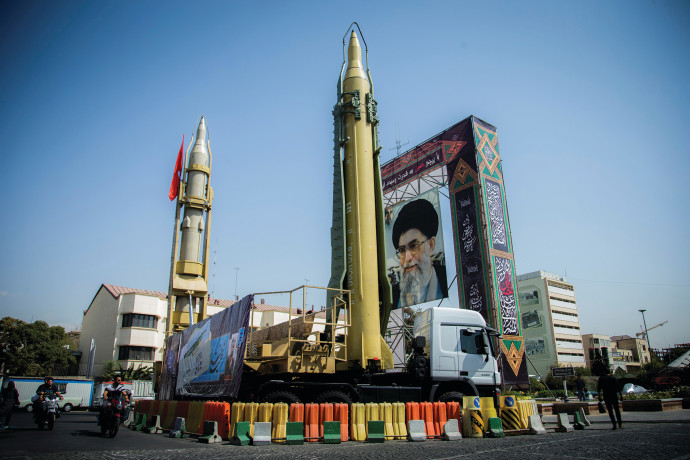
It’s hard not to be impressed by statements from Washington that can practically be taken to mean that the United States’ position on the nuclear issue is to gain time; that is, to postpone to the extent possible Iran’s nuclearization.
Iran is conducting nuclear tests and in response, Israel is launching its F-35 aircraft and destroying Iranian nuclear facilities. According to “foreign sources,” Israel has used low level nuclear weapons in the operation. Following the operation, Israel placed all its multilayered defense capabilities in a state of readiness and acted via diplomatic channels to dissuade Russia and China from supporting Iran, but even more important from Israel’s perspective was, of course, the position of the United States, which warned Iran not to escalate the situation. At the same time, the United States raised its level of cooperation with Israel with the possibility of a military operation against Iran along with coordinating intelligence. An important goal from America’s perspective, in addition to getting an immediate reaction, was to increase efforts at preventing the spread of nuclear weapons throughout the Middle East.
No, this is not a real scenario. It is a war game, a type of “dry run exercise,” arranged recently by the Center for Strategic and International Studies in Washington together with the official research agency of the U.S. Defense Department. This, along with participation by dozens of American and international experts, lent the exercise particular importance. As explained at the outset of the exercise, the entire imaginary scenario took place against the background of America’s ongoing withdrawal from the Middle East, including the gradual pullback of its military forces in the face of efforts by Russia and China to fill the vacuum, and to demonstrate the differences among Donald Trump, Barack Obama and Joe Biden. But practically speaking, there is more continuity in policies than differences, especially with regard to the Middle East (and as it turns out, in matters of taking home classified documents). All three leaders continued the policy of moving the American strategic axis from our region to the Far East. In America, two books were recently published on U.S. foreign affairs and security policy through the years – one by Robert Kagan, a senior member of the Brookings Institution in Washington, and the second by Richard Haass, president of the Council on Foreign Relations and a former senior official in the administration of George W. Bush. (Both Kagan and Haass, by the way, are Jewish.) As they point out, American policy, from the days of Founding Father Thomas Jefferson until today, vacillates between focusing on itself and sometimes on isolationism, and projecting great power to ensure global order, whether this springs from its own interests or whether it acts according to what it sees as basic ideological values, such as support for Israel.
Turning back to the opening exercise, one of the central conclusions likely to matter in a real scenario was that “the most important determining factors regarding American influence capability are individual relations and the measure of trust between the president of the United States and the prime minister of Israel and, despite the institutional and intelligence cooperation between the sides providing support for these relations, they are no substitute for personal relations.”* Therefore, in the opinion of the exercise administrators, “the major factor in determining possible developments is the quality of relations between the United States and Israel.”* It turns out that strong personal relations with Biden also factor into Israeli Prime Minister Benjamin Netanyahu’s course of action. The exercise also presented a four-year time frame for Israeli military action against Iran, but the hour glass could run out much sooner.
All current diplomatic sensors in Israel, in addition to expanding the scope of the Abraham Accords, are directed at this issue. After 18 months of political lethargy, the new government has aggressively begun to thwart Tehran’s nuclear goals, a major topic during Netanyahu’s meeting with French President Emmanuel Macron, and this issue will be important in upcoming political meetings. Of course, the issue is also up for discussion with President Biden in Washington, as it was in previous meetings in Jerusalem with National Security Advisor Jake Sullivan and Secretary of State Antony Blinken. Biden, in fact, has stated repeatedly that “Iran will not have nuclear weapons” and we should not doubt his intentions.
At the same time, it is hard not to be impressed by various statements from Washington meant to buy time; that is, to stall Iran’s nuclearization of Iran as much as possible to the extent possible, without taking decisive military or economic action, such as increased sanctions, to bring an absolute halt to Iran’s nuclear efforts. Netanyahu, who warned about the danger of Iranian nuclearization before many others, is now working to optimize his best position together with Biden, but will also try to advance other options. Israel sees the trend in Iran as an existential threat; however, in the eyes of the United States, the Iranian threat is grave but not at the level of the geopolitical and military threats that China and Russia pose, particularly because in terms of its strategic planning, the Middle East is less important than the Far East. A “dry run exercise” is one thing, and reality is something else — or perhaps not; but Israel’s mission and Netanyahu’s is to advance an understanding with the United States. In other words, the central importance of U.S. relations with Israel will be translated into action, a mission that in the view of certain American observers is also in line with the strategic interest of the United States itself.
*Editor’s note: Although accurately translated and attributable to the Center for Strategic and International Studies, the precise language used in this excerpt could not be independently verified.

Leave a Reply
You must be logged in to post a comment.